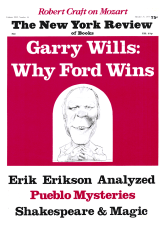In response to:
Freud and the Imagination from the April 3, 1975 issue
To the Editors:
Charles Rycroft [NYR, April 3] on Freud and the Imagination has re-introduced the will via the arts. Part of his argument rests on the interpretation of a passage by Charles Darwin, after Jean Paul Richter, who said, “The dream is an involuntary art of poetry.” Rycroft believes Darwin said, ” …act of poetry,” but misquotes (Charles Darwin, The Origin of Species and the Descent of Man, New York, Modern Library, n.d., p. 453). It would be a waste of time to correct a mere lapse of the pen had not Rycroft devoted some thought and space, and constructed a theory out of whole cloth upon this misconstruction. Darwin’s point is not to make the involuntary imagination and dream into an exclusively human concern, but to link them with the movements and sounds in sleep of dogs, cats, horses, birds. The dreams as an involuntary art of poetry to the poet, of music to the musician, are not a specific object; Darwin, as Richter before him, was drawing attention to the stored up power of dream, not to a definite act. Contrary to what Rycroft feels Darwin may have meant, the dream is not an act in this nineteenth-century conception, it is a reservoir or potential on which we draw, and which we shape; hence the phrase, “involuntary art of poetry.” Darwin then inferred from specific acts of behavior that this world is stored up in the animals too.
Freud dealt infrequently with the will. In his work on “Mass Psychology and Ego Analysis” (1921), he devoted some lines in chapter 10 to the evolution of the will in humanity, from the primal horde to modern times. It is represented as weak in the early state of humanity, when there was only the common will. Later in the same section of the book he returned to the subject of the will in connection with hypnosis. Freud linked the surrender of the will by the hypnotized to the hypnotist with the passive-masochistic relation of the individual in the primal horde to the primal father. This is not so much imaginative as speculative ethnology, and has but little bearing on current ethnological conceptions. How the psychoanalysts stand to this formulation falls outside my competence. Perhaps Rycroft and his colleagues can straighten out what he and Freud really mean, in particular, what Rycroft really means to say, and he can face honestly what the past generations have said. Freud does append the comment, in the same passage, that there are some to whom it appears a risk, a hazard (ein bedenkliches Wagnis) to look a doubtful relation squarely in the eye.
Lawrence Krader
Institute of Ethnology
Free University of Berlin
Charles Rycroft replies:
The edition of Darwin’s The Descent of Man which I used (Murray, 1890) also has “The dream is an involuntary art of poetry,” but I assumed, I now think wrongly, that the word “art” was a misprint, since the sentence as it stands is ungrammatical and tautological—why not “dreams are involuntary poetry”? However, I now suspect that the English word “art” is a mistranslation of the German word “Art” and that what Richter was saying was simply that dreams are an involuntary kind of poetry. In any case I fail to see how my argument is affected by whether Richter said that dreams are an involuntary art, act, or kind of poetry.
This Issue
October 16, 1975



